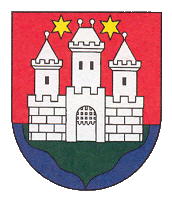Komárno: Difference between revisions
Jump to navigation
Jump to search
Knorrepoes (talk | contribs) m (Text replace - "|}|}<" to "|}<") |
Knorrepoes (talk | contribs) m (Text replace - "ľ" to "ľ") |
||
| Line 19: | Line 19: | ||
The Hungarian city of [[Komárom]] opposite the river uses similar arms, as until 1918 both cities were united. | The Hungarian city of [[Komárom]] opposite the river uses similar arms, as until 1918 both cities were united. | ||
[[Literature]] : Kartous et al, 1991; Slowakei - Spaziergänge durch die Jahrhunderte der Städte und Städchen. Piroda, Bratislava, 1994 (German version, ISBN 80-07-00531-5); Kartous and | [[Literature]] : Kartous et al, 1991; Slowakei - Spaziergänge durch die Jahrhunderte der Städte und Städchen. Piroda, Bratislava, 1994 (German version, ISBN 80-07-00531-5); Kartous and Vrteľ , 2000 | ||
[[Category:Slovak Municipalities K|Komarno]] | [[Category:Slovak Municipalities K|Komarno]] | ||
[[Category:Komárno|Komarno]] | [[Category:Komárno|Komarno]] | ||
[[Category:Granted 1745|Komarno]] | [[Category:Granted 1745|Komarno]] | ||
Revision as of 08:42, 9 November 2012
| Heraldry of the World Civic heraldry of Slovakia (Slovenská Heraldika Miest a Obcí) |
KOMÁRNO
Province : Nitra
District (okres) : Komárno
Official blazon
Origin/meaning
The arms first appear in the seal of the city from the first half of the 15th century, and are a typical image for a city. To distinguish the composition from those of other cities the two stars were added. The arms were officially granted in 1745, with the castle now placed on an island between the two rivers Danube and Waag. The arms have not changed since.
The Hungarian city of Komárom opposite the river uses similar arms, as until 1918 both cities were united.
Literature : Kartous et al, 1991; Slowakei - Spaziergänge durch die Jahrhunderte der Städte und Städchen. Piroda, Bratislava, 1994 (German version, ISBN 80-07-00531-5); Kartous and Vrteľ , 2000

